I'm about to do something that has become a rather unpopular thing on the internet -- especially among liberal and progressive-minded people such as myself. I'm about to explain why I consider Rey to have been a "Mary Sue" in Star Wars: the Force Awakens.
I'm not doing this because I want to hate on the movies for the sake of hating them. I'm also not trying to hate on Daisy Ridley, and Daisy, if you read this, I want you to know that I think you did a fantastic job with the material that was given to you. I'm being critical because I want the movies to be better than they are. I have very high standards and expectations when it comes to Star Wars, and I feel that Disney's efforts so far have been sub-par. So much so that I often find myself using phrases like ... sigh ... "to the prequels' credit". I hate having to say that. It makes my skin crawl every time. I'm at a point, however, in which I find myself pointing out merits in the prequels as a point of contrast against flaws that I perceive in Disney's Star Wars films, as if one set isn't better or worse than the other; but rather, that they are just ... different.
I don't hate Rey. I am critical because I want these characters to be better.
So even though this is kind of old news that's been beaten to death for over two years, let's talk about Rey for a moment. And regardless of which side of this issue you fall on, I hope that you read the following with an open mind. And if you disagree, then that's fine. I'm not going to fight you over it.
"Mary Sue" is a subjective qualifier
Let's start with some background. The definition that I use for a Mary Sue is:
A fictional character (often appearing in fan fiction) who is primarily a vehicle for wish-fullfillment (usually being a self-insert stand-in for the author), and who is unjustifiably-competent in multiple fields -- if not everything.
Typically, these characters are good at everything they do. They get along with other established characters exceedingly well (sometimes even being romantically pursued by one or more of the canonical characters). They have few (if any) flaws. They are an idealized character who is essentially a "perfect" character within the fiction. They are also -- pretty much by definition -- characters who are added to a fictional setting long after its initial establishment.
The term "Mary Sue" is derived
from Star Trek fan fiction.
The term originated in Star Trek fan fiction, having been coined in 1973 after the publication of a parody story "A Trekkie's Tale" in the fan magazine Menagerie. This particular story (written by Paula Smith) was about a 15-year-old female character named Mary Sue, and it satirized the unrealistic nature of many characters in other fan fiction stories. Lieutenant Sue was the youngest Lieutenant in Starfleet and was an expert in virtually everything she did. She was "the best and the brightest" of Starfleet.
First off, I want to get one thing straight: whether or not a character is a "Mary Sue" is a subjective opinion. Whether or not any individual reader or viewer considers a given character as a "Mary Sue" is going to depend greatly upon where that individual draws the line between "justifiably-competent" and "unjustifiably-competent". That line will vary from person to person, and from fictional universe to fictional universe. I draw that line at a much different place for Star Wars than I do for Star Trek. In addition, this line is not always a hard or clear-cut line. It might be very fuzzy. The fuzziness of the line will also vary from person-to-person and from fictional-universe-to-fictional-universe. It's all on a continuum. Even within a single fictional universe, one character may be " more Mary Sue-ish" than another character.
Identifying a character as a Mary Sue also does not necessarily mean that the work of fiction (or even the character) is inherently bad. [More]
33b6a16d-ced8-4021-861e-c99f868a24d4|0|.0
Tags:Mary Sue, fan fiction, Star Wars, Star Wars: The Force Awakens, Star Wars: The Last Jedi, Disney, Rey, Daisy Ridley, Luke Skywalker, The Empire Strikes Back, Return of the Jedi, the Force, Jedi, Jedi Mind Trick, James Bond, Harry Potter, Sherlock Holmes, Neo, Superman, Doctor Who, James T. Kirk, Star Trek, Wesley Crusher, Gene Roddenberry, canon, women, sexism, gender, equality, gender equality
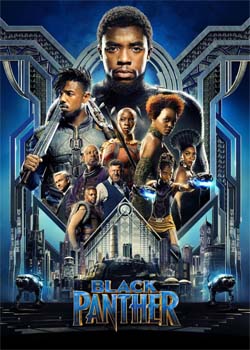
It's really getting hard to imagine Marvel and Disney ever genuinely screwing one of these movies up. I keep expecting that the next Marvel movie is going to be the one that finally breaks the camel's back and brings the whole enterprise crashing down. It's getting increasingly difficult to trust or like Disney as it grows into even more of a massive corporate conglomerate that keeps devouring and controlling pop culture media. From its virtual monopoly on childhood fairy tale and story-book imagery, to its ownership of cultural touchstones like Star Wars, to its success with Marvel, to its plans to purchase Fox's film studios and all the properties therein (Alien vs Predator vs Guardians of the Galaxy, anyone?), Disney is growing scarily large and powerful and owns far too much of our shared pop culture. Heck, Disney also owns ESPN and therefore has a controlling stake in how our non-fiction cultural entertainment is presented to us as well! This gives the Disney Corporation a potentially-dangerous, unprecedented influence on the world's collective cultural consciousness.
After the Fox buy-out, Disney and its subsidiaries could own up to 40% of every movie that comes to theater screens, and the studio's growing monopoly on blockbusters could translate to a virtual monopoly in cinemas in general. With so much theater revenue coming from Disney movies, theaters are forced to accept distribution deals that are increasingly one-sided in Disney's favor.
Because of all this, I find myself actually hoping to a certain degree that Disney and Marvel finally screw one of these up and release a flop of Batman v Superman proportions. I keep hoping for its tightening grip on cinemas to loosen and allow other competitors to finally step up and put Disney in its place. Once again, that hasn't happened.
Black Panther expertly straddles several different film genres. Most obviously, it's a comic book superhero movie (d'uh). But it's also a very mythological movie, and also sci-fi futurism (from a rarely-seen Afro-futurist perspective). And there's a large spy thriller chunk in the middle that could have been pulled straight from a James Bond movie, complete with a Q stand-in reviewing the hero's new gadgets, and culminating in a super-powered car chase through an exotic foreign city. There's also a Shakespearean bent that comes from the themes of living up to one's father's legacy, dealing with a monster of your own making, and noble intentions going awry. It all works pretty well, with only a few minor stumbles.
Part mythologic super hero story, part sci-fi futurism, part James Bond spy thriller.
I'm not sure how much of the production design was handled by individuals who are black or African or of direct African descent (or if it was a bunch of white guys in a conference room wondering "what would African futurism look like?"), but the end result seems (from my perspective as being descended from white European imperialists) to be very faithful and respectful. It's also a visual treat. I felt like some of the Vibranium technological gimmicks were a bit "too much" for a setting that is supposed to be our contemporary world. Specifically, the magic balls that can apparently instantly heal fatal wounds strained my credulity quite a bit, especially since I don't think the movie ever really explained what Vibranium does or what it's actual limitations are. Then again, this is the umpteenth installment in a series that has World War II super-soldiers, men flying around in robot suits of armor, literal Norse gods descending from literal Asgard, magic space rock MacGuffins, space aliens, and even literal magic. A little suspension of disbelief is to be assumed... [More]
e1168620-d264-4c4b-a058-572b72f1e19f|0|.0
Tags:Black Panther, Disney, Marvel Comics, comic book, Chadwick Boseman, T, Challa, Michael B Jordan, Killmonger, Andy Serkis, Wakanda, Africa, Vibranium, science fiction, futurism, James Bond, social justice
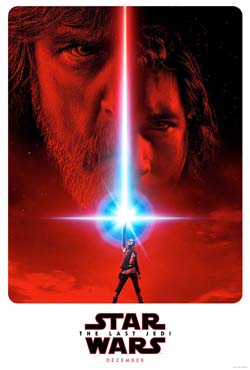
If there was one thing that was going to completely derail this movie for me, it was going to be its tone. The cockpit furby in the trailer was completely off-putting for me, and the actual movie begins with a dumb joke that makes one of the movie's key villains look like a complete dolt. Maybe that's the point, but the joke fell completely flat, pulled me out of the movie, and the movie had to do a lot of work from then on in order to pull me back in.
Fortunately, it eventually did pull me back in and held me throughout. I was totally on-board with the direction Rian Johnson took Luke Skywalker, and the parts of the movie that take place on the island were the definite highlights for me. Tone was still an issue though. There's a lot of attempts at humor that fall flat on their face. About the only jokes that worked for me were Luke tickling Rey's hand with the leaf and Luke chucking the lightsaber over his shoulder (apparently in the same place he chucked his X-Wing and all his other unwanted garbage).
Obviously, this movie takes a lot of its thematic and tone queues from The Empire Strikes Back. It's the middle movie in a trilogy that's [assumedly] not going to end with the main character murdering all the other good guys in cold blood and turning into a bad guy, so it has to be dark and brooding. The juvenile humor (along with the cartoonish action) just completely doesn't work in a movie that takes itself as seriously as this one does.
Those bad jokes and occasional cartoonish action sequences are surrounded by a movie that actually does have a lot of meta-thematic weight to it and tries very hard to push the Star Wars universe in a new and interesting direction. This isn't the fan service vehicle that The Force Awakens and Rogue One were. This is an actual movie with something to actually say about movies and fan communities. It doesn't hit quite as hard as Black Mirror's recent evisceration of fan entitlement via a Star Trek parody, but it comes close. As much as The Force Awakens delighted audiences with its whole-hearted embrace of nostalgia and fan service, The Last Jedi works very hard to actively disappoint fans. As the trailers promise, "this does not end the way you think", and from here on out, it's SPOILER TIME:
The Last Jedi goes out of its way to disappoint, regardless of what fan theory(ies) you subscribed to. [More]
66ac085b-1075-478b-a2d3-1af81be7e711|0|.0
Tags:Star Wars, The Last Jedi, Star Wars: The Last Jedi, Lucasfilm, Disney, Rian Johnson, Rey, Kylo Ren, Supreme Leader Snoke, Leia Organa, Carrie Fischer, Luke Skywalker, Chewbacca, Han Solo, hyperdrive, Black Mirror, toxic fandom
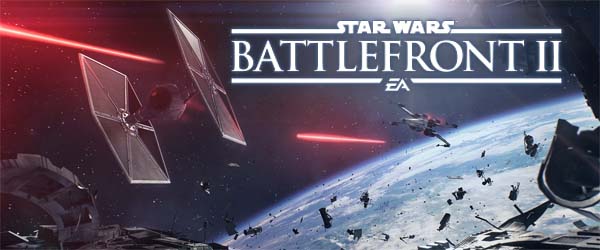
Dang, I was really hoping to get this one out before the end of the year...
Thanks to previews, journalists, and complaints from beta users, this is yet another game that I knew better than to buy on launch day at full retail price. Even before the game came out, beta players and gaming websites were already condemning Battlefront II for its pay-to-win multiplayer system. When the media finally got their hands on preview builds of the full game, they were quick to attack the online progression system. Once the game was released, public outcry forced EA to literally neuter the game's online economy.
Slot machines are legally required to disclose
their paytables -- and sometimes their RTP.
EA started damage control by slashing the prices of heroes so that they supposedly weren't as much of a grind to unlock. However, the sneaky bastards also reduced the rewards for various in-game activities (such as completing the campaign), so as to render the cost reduction virtually moot. Then, EA disabled micro-transactions altogether. So by the time I finally started playing the game (over a month after launch), it was a totally different experience than it was intended to be at launch.
Star Wars license-holder Disney was furious with EA for potentially tarnishing the Star Wars brand (especially with the pending release of The Last Jedi). EA's stock prices fell as a result.
Battlefront II has actually caused law-makers and regulatory agencies in the United States and Europe to consider whether loot boxes qualify as "gambling", and whether they should, therefore, be regulated as such, including banning their sale to minors. Corporations are also starting to hop onto the bandwagon of self-regulation. Apple announced that all iOS apps with randomized micro-transactions must disclose the odds associated with rewards. This is the same disclosure that is actually legally required for actual gambling, such as slot machines.
For the record, I do not object to gambling per se. I actually bet every week on college and NFL football. Don't worry, I live in Nevada; it's legal for me. I spent almost three years working as a game developer for a slot machine manufacturer, and the only reason that I'm not still at that job is because the entire department in which I worked got laid off in the wake of a corporate merger (I'm actually very bitter and opposed to corporate mergers, by the way, but that's a discussion for another time). So I don't have a problem with gambling. I just think that it has a time and a place, and I don't want that time or place to be in my video games that I'm already paying $60 just to play. This is why casinos don't generally charge a cover fee.
I personally feel that Shadow of War and Destiny 2 are much more egregious examples of corporate avarice.
Also, for the record, I think that Battlefront II's micro-transaction controversy is a bit overblown. It's an online multiplayer shooter in which there is no win condition or end state. Whether you want the extra hero characters, and whether you're willing to spend time or money to get them is entirely up to the player's own whim. The game is perfectly playable without those heroes, and you can play through the campaign completely without spending an extra penny. It's a bit sleazy that EA markets the game by advertising these characters, and then locks them behind a grind/pay wall, but fighting games have been hiding unlockable characters behind grind-walls for decades.
Battlefront II isn't even the worst micro-transaction / pay-to-win system to come from EA! EA Sports titles like Madden and FIFA have been getting away with much worse pay-to-win systems (via their respective Ultimate Team modes) for years. Personally, I also think that Shadow of War (review coming very soon) has a much more offensive micro-transaction model because Warner Bros actually tied it into that game's campaign. If you want to finish the story, you either have to sit through the grind, or pay to speed it up. Though all of these pale in comparison to Activision and Bungie locking formerly-accessible end-game content behind the pay-wall of a Destiny 2 expansion pack.
In any case, it's sad that a review of a video game has to turn into a political op-ed, but that's the sad state of things right now.
Controversy and public outrage forced EA to completely disable in-game purchases.
So, if I knew that the game was controversially terrible, why did I bother to play it? ... [More]
ca397aec-963c-441f-946e-73a4ac8e54dd|1|4.0
Tags:Star Wars, Star Wars: Battlefront, Star Wars: Battlefront II, loot box, micro-transaction, multiplayer, shooter, single player, campaign, Galactic Empire, Imperial Raider, Star Wars: X-Wing, Disney, EA, Electronic Arts, DICE, Motive Studios, Criterion Games, gambling, regulation, casino, eBay
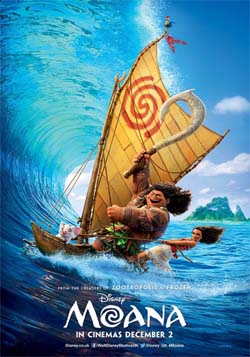
I saw Moana in theaters back in December. My girlfriend and I took our six-year-old to see it. I had meant to review it at the time, but it sort of slipped through the cracks of a busy holiday schedule. Well, now the movie is available for digital viewing and is going to be released on home video on March 7th. I'm already having to sit through it again, and will probably have to sit through it some more, and the six-year-old has been insisting on listening to the soundtrack in the car whenever we've driven anywhere over the past month or two. And you know what? I don't have a problem with it, because I really like this movie (and its soundtrack).
In the meantime, I've talked about this movie a lot. Everyone seems to like it, but I've found that I seem to like it for reasons other than the people who I've spoken to, which is why I decided to go ahead and write the review.
Most people seem to enjoy Moana for its progressive feminist messages. This is certainly true. She is the heir to her village's chiefdom, and this fact is taken completely for granted by the community. No one seems to question her ability to lead or her claim to authority based on her gender. Her ascendancy to authority (or a villain trying to prevent that ascendancy) isn't the central conflict of the movie. She isn't looking to marry in order to legitimize her claim, nor is anybody trying to marry her in order to usurp her throne. The idea of a woman being chief seems completely normalized in this society. There's no reason to believe that this village hasn't already had female chiefs (perhaps Moana's grandmother was a chief?), nor does anyone seem to think it would be unusual for the village to have a female chief in the future. The dispute between herself and her father are more ideological and practical, as she's drawn to the ocean by her desire to explore, while her father is committed to remaining on the island where it is presumably safe.
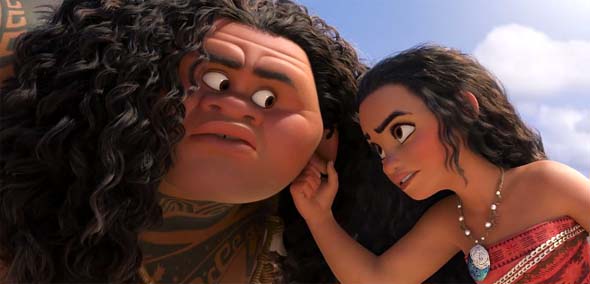
Moana is an excellent female role model, though at the cost of Maui being reduced to a narcissistic jerk.
There's also no silly or forced romance subplot, which is a huge deviation from the norm for the Disney princess archetype (and Maui even jokes that Moana is a princess). There's no romantic or sexual tension between Moana and Maui, nor does Moana feel any pressure to find love in order to make herself whole or validate her authority as village chief. She is a completely independent person. It is a shame that her strength as a character has to come at the expense of Maui (a beloved figure in the mythology of Polynesia) being portrayed as narcissistic jerk for most of the movie. But he does redeem himself at the end and is still a likable character.
The feminist and female empowerment messages are all well and good. But I think that my favorite element of the movie is that there's no traditional villain. There's a few incidental antagonists, but no central villain who directly opposes the heroes throughout the movie. There's no Maleficent, no Scar, no Jafaar, no Prince Hans. The big bad monster at the end of the movie is the closest thing the film has to an overarching villain, but even that isn't so much a genuine villain, as it is simply a misunderstood force of nature (and a rather obvious metaphor for human-induced climate change and ecological destruction).
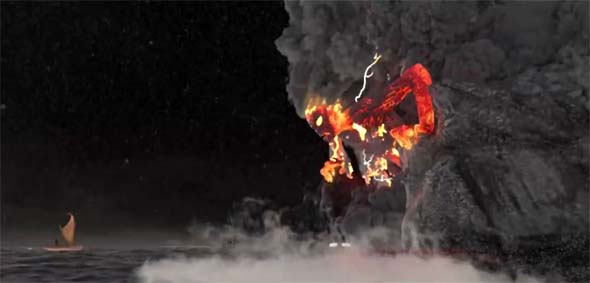
There is no true, singular villain. The big, bad monster at the end is more a misunderstood force of nature.
Moana's central conflicts are person versus self and person versus nature... [More]
97cbedc4-6479-4351-bec8-d70e764c3a94|2|3.0
Tags:Moana, Disney, Auli'i Cravalho, Dwayne "The Rock" Johnson, Lin-Manuel Miranda, Hawai'i, Polynesia, Maui, Motunui, mythology, creation myth, demi-god, princess ocean, way-finding, Te Fiti, Te Ka, Tamatoa, Kakamora, feminism, progressive, broadway
|

| 12 | | | | | | | 60 | | 11 | | | | | | | 55 | | 10 | | | | | | | 50 | | 09 | | | | | | | 45 | | 08 | | | | | | | 40 | | 07 | | | | | | | 35 | | 06 | | | | | | | 30 | | 05 | | | | | | | 25 | | 04 | | | | | | | 20 | | 03 | | | | | | | 15 | | 02 | | | | | | | 10 | | 01 | | | | | | | 05 |
|